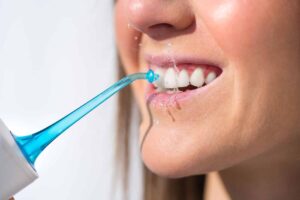
Investing in full mouth dental implants is a significant step toward restoring your smile and confidence. However, to maintain the longevity of your dental implants, diligent oral hygiene is paramount. Enter water flossing—a revolutionary addition to your dental care routine that can make all the difference. Unlike traditional flossing methods, water flossing offers a powerful yet gentle way to clean between your teeth and around implants, making it a critical component of oral hygiene for implant longevity.
The Essential Role of Oral Hygiene in Implant Care
Full mouth dental implants are not just an investment in your appearance but in your overall health. Without proper care, implants can face risks such as infection, gum disease, and even failure. These issues underscore the necessity of a robust oral hygiene regimen to protect your investment. Good oral hygiene practices help prevent plaque buildup, which can lead to gum inflammation and compromise your implants.
Benefits of Embracing Water Flossing
Enhanced Oral Hygiene
Water flossers provide an exceptional cleaning experience by reaching areas that traditional floss might miss. The high-pressure stream of water cleans around the implant and below the gumline, removing debris and reducing the risk of bacteria accumulation.
Reduced Risk of Gum Disease
Gum disease is a common threat to dental implants. Water flossing effectively reduces plaque and bacteria, key contributors to gum disease. By incorporating water flossing into your routine, you significantly minimize these risks, helping to maintain healthy gums around your implants.
Long-Term Protection for Dental Implants
Consistent water flossing not only enhances oral hygiene but also offers long-term protection. By preventing plaque buildup and gum disease, water flossing helps keep your implants secure and healthy for years to come.
Safeguarding Your Investment with Water Flossing
Water flossing is more than just a hygiene practice; it’s an investment protector. By extending the life of your dental implants, water flossing proves to be a cost-effective tool. While the initial purchase of a water flosser may seem like an added expense, the benefits of implant longevity and reduced risk of costly dental issues make it a wise financial choice.
Practical Tips for Effective Water Flossing
Mastering the Technique
For effective water flossing, fill the device’s reservoir with lukewarm water and adjust the pressure to a comfortable setting. Lean over the sink, place the tip in your mouth, and aim it between your teeth. Glide along the gumline, pausing briefly between each tooth to ensure thorough cleaning.
Optimal Usage Frequency
To maximize benefits, use your water flosser daily. Ideally, incorporate it into your nighttime routine to remove food particles and plaque accumulated throughout the day.
Making Water Flossing a Daily Habit
Integrating water flossing into your daily routine can be seamless. Start by setting a reminder on your phone or placing your water flosser next to your toothbrush. Treat water flossing as a non-negotiable part of your daily oral care, just like brushing and regular flossing.
Keep Your Implants Healthy and Secure
Your dental implants are a valuable investment in your health and well-being. Water flossing offers an easy and effective way to protect this investment by maintaining oral hygiene and preventing complications. By embracing this simple yet powerful tool, you ensure that your implants remain healthy and secure for years to come. Take the first step today and incorporate water flossing into your routine to safeguard your smile.